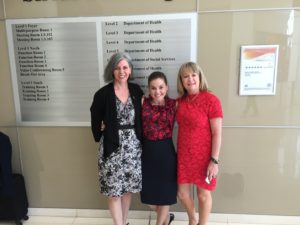You know those moments where a switch flicks and you see something so clearly that it makes you jolt to attention? Often it isn’t something completely new but a new frame for a concept or idea that you have been dancing around.
I love those moments, don’t you?
A few months ago I was writing a speech for a global healthcare organisation. I had recently become more interested in the process of how medications and health services are made available in Australia (where we have publicly funded health care) and had been invited to discuss the role of the patient and their perspective in that process.
I had gone much of my life happily accessing medications and services through our health system oblivious to the processes that got them there. Of course there had been times when I had been frustrated (and angry) when certain things I needed weren’t available or I had to be ‘creative’ about accessing them, however I had never put a lot of thought into the basis on which they weren’t available beyond simply economic constraints.
Cystic Fibrosis is a complicated condition to treat. We often require many medications all of which treat various symtoms that produce a combined effect. Because I was on so many medications there had always been a way to work around it if something wasn’t available and my health didn’t seem terribly impacted by the absence of a single medication. That was until I started Orkambi. The breakthrough medication that is the first of its kind to treat my genetic mutation of cystic fibrosis. There was no comparator and no alternative.
I feel pretty stupid writing that now but in all honesty, my previous thinking was if treatments and services weren’t available there was very little scope for patients to change that.
I think that is how a lot of patients feel – frustrated but powerless.
But at the prospect of not having Orkambi, the stakes were very high. I could not be complacent. I needed to know where and how the system included voices like mine in the approval process – that there was mechanisms for the stories that go beyond the numbers to be heard and valued.
It was in that learning process I realised something about our health system. In Australia the current frameworks for health technology assessment (for example PBS listing process) provide patients very little scope for formal inclusion and a means of valuing that.
What does that mean?
Essentially the decision about why, how or on what basis a treatment or medication is available IS a numbers game. Not only in terms of cost effectiveness but importantly, how a decision is made as to just how effective it is.
In our system, the gate keepers of my choices to treat my disease are people who don’t necessarily understand what it means to live with it and what I value in treating it, because there are very limited mechanisms for me to tell them.
Put simply, decisions are based on more on perceived need rather than lived experience.
Let’s be realistic, my interpretation of effectiveness is based more on what I can do in my life with this medication than the numbers it has helped me record on a piece of paper. Of course, we can’t base health care decision making on this type of qualitative evidence however, shouldn’t these experiences at least have a (formal) seat at the table?
As I crafted that into words for my speech, I had my ah-ha moment: No matter what I put out into the world to support those living with chronic illness to feel empowered and connected in their healthcare, if they were continually hitting systematic blocks, the benefit became limited. Patients could be the best possible advocates for their own needs but still be unable to make the choices that were most important to them. This inspired me to look more broadly at the work I was doing.
To be able to choose to approaches to health care and treatment that most serves patient needs, individuals need to not only feel educated and empowered but also be working within a system that recognises what is meaningful and valuable to the those it aspires to serve. To have a system that is truly patient focuses we need change in both areas – individual empowerment and systematic evolution. Patients need a formal voice within the system which is currently very limited in Australia.
Realising that lead me to the question, if medications and services are not considered effective in ways patients deem valuable how effective are they really?
Over the past few months I have made it my mission to understand more about this and what needs to happen for change to occur. While the advances in medical technology continually astound me (and without a doubt are enabling us to extend life), I believe we can do better.
I believe we have the capacity to build a health system that recognises that the best outcomes for patients isn’t only to survive. By including patients and their experience in the assesemnt process we recognise what matters to them. We create a system that supports them to live.
For me, advocating for that system as well as supporting individuals, is the most meaningful way to create the best possible experience for patients and a place for them from which for them to enjoy the best health possible.

Consumer hearings such as the one I attended earlier this year with Cystic Fibrosis Australia are an important recent addition to the health technology assessment process in Australia. Enhancing initiatives such as these is beneficial to all stakeholders but particularly patients.
As part of this expanded mission to empower patients, I have been working hard with a group of wonderful individuals from health care organisations, patient advocate groups and the pharmaceutical industry on a project we have called The Patient Voice Initiative. The objective is simple: To enhance the patience voice in health care technology assessment (which includes things like the listing of medications on the PBS and medical devices through medicare). If you would like to be involved with this you can find more information here or via my Facebook page.
*Please note, if you have CF and would like to come along, please let me know so we can adhere to infection control protocol.
I will also be trying to share more articles about the role and potential role of patients in health policy with my community with the intention of providing patient orientated information. In this area knowledge is certainly powerful. I would love your thoughts and feedback on this to help me serve you in the most relevant way. Don’t forget to comment either here or on Facebook and let me know what you would like to know more about and how you would like to see patients included in health care decision making.










You must log in to post a comment.